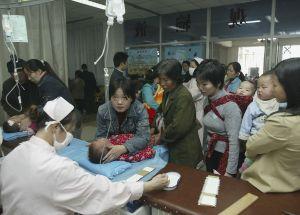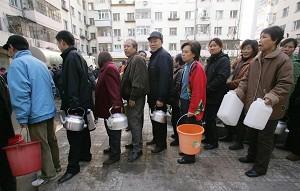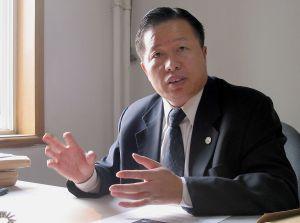BEIJING — About 100 reporters of the Beijing News walked out after this week’s sacking of the daily’s top editor, the latest victim of China’s strict press controls, industry sources said on Friday.
But while Communist Party officials were reasserting their hold on the feisty tabloid, nearly instantaneous Internet reporting of the dismissal and a flurry of online discussions suggested some of the limits of its control.
Internet postings decried the dismissal of Yang Bin as editor-in-chief of the Beijing News.
The paper, founded in 2003, was still published on Friday. But a list of senior editors disappeared from its second page.
Part of the tabloid’s staff showed their displeasure over Yang’s dismissal by not turning up for work on Thursday, media industry sources said.
Some reporters estimated about 100 staff had walked out. Although some later returned, on Thursday night the paper’s usually busy current affairs and arts editorial offices were quiet.
One source, who requested anonymity, said reporters were forced to show their support for a new top editor.
A petition denouncing Yang’s dismissal and the handover of controls to more conservative editors from the Beijing News’ parent newspaper, the Guangming Daily, was circulated among staff, said reporters.
“Political Mistakes”
A sister newspaper, the Southern Metropolis News in Guangdong province, sacked Xia Yitao as its deputy editor-in-chief this month over a headline about a vice governor receiving a demerit over a deadly coal mine accident, media industry sources said.
Chinese blogs and Internet chat rooms reported the Beijing News dismissal soon after reporters there heard of the decision, triggering a wave of online denunciations.
Another blogger urged readers to cancel their subscriptions. “(We) demand they immediately and unconditionally return our annual subscriptions,” said Anti, a well-known media commentator.
China’s rapidly growing Internet is heavily policed by censors and filters that block users from entering sites: many reports of the Beijing News dismissal were removed from Internet sites after an hour or two.
But China’s explosive Internet growth, with 100 million registered users, makes it difficult for even China’s vigilant censors to block news.
Additional reporting by Benjamin Kang Lim
Supplemental Report: Media Crackdowns in China
The dismissal of the top editor of one of China’s boldest newspapers this week was the latest in a series of crackdowns on journalists by the government.
Beijing has in recent years tightened the noose on the media, as well as the Internet, academia, non-governmental organisations and other perceived threats to stability and the Communist Party.
China was the world’s top jailer of journalists this year for the seventh year running, according to the New York-based Committee to Protect Journalists.
The following is a list of steps taken against Chinese publications and arrests of journalists in recent years:
----
Dec 2005 - Yang Bin, editor-in-chief of Beijing News, a tabloid that has reported on such official misdeeds as a bloody crackdown on protesting peasants in northern China, is removed.
Dec 2005 - The deputy editor-in-chief of Southern Metropolis Daily, a sister paper of the Beijing News in southern Guangdong province, is sacked over a headline about a vice governor receiving a demerit after a deadly coal mine accident.
Sept 2005 - Authorities suspend publication of the regional Henan Business News for one month after it reported on officials giving journalists hush money over a deadly coal mine accident.
April 2005 - Shi Tao, a former editor for the Contemporary Business News in Hunan province, is sentenced to 10 years in prison for providing state secrets to foreign-based Web sites.
April 2005 - Ching Cheong, a Hong Kong resident and reporter for Singapore’s Straits Times, is detained in southern China and later arrested on charges of spying. His case is expected to go to court in early January.
March 2005 - Jiao Guobiao, a journalism professor at Peking University, is effectively sacked after criticising the Communist Party’s propaganda machine.
Dec 2004 - Chen Min, chief editorial writer of the China Reform magazine, is detained for unknown reasons.
Nov 2004 - Journalist Wang Guangze of the 21st Century Business Herald is sacked under pressure after talking about Internet curbs and China’s political future at a U.S. seminar.
Oct 2004 - New York Times researcher Zhao Yan is detained and later arrested for exposing state secrets or giving his employer details about rivalry between outgoing Communist Party head Jiang Zemin and new leader Hu Jintao. Zhao has yet to go on trial.
Sept 2004 - Authorities sack editors and restructure the Tongzhou Gongjin magazine in Guangzhou after it carried an interview with reformist Communist Party veteran Ren Zhongyi, who made a bold plea for separation of powers and political reforms.
March 2004 - Cheng Yizhong, an editor who helped found the Beijing News, is arrested on embezzlement charges related to his time at the Southern Metropolis Daily. Yu Huafeng, the newspaper’s former manager, and Li Minying, its editor-in-chief, are arrested for taking bribes.
Cheng is later released without charges, but Yu and Li receive jail terms of eight and six years, respectively.
Southern Metropolis was the first to report in 2003 on a migrant worker who died in police custody, sparking public outrage, sackings of officials and reform of China’s detention system. It was also at the forefront of reporting on SARS.
March 2003 - China suspends publication of the 21st Century World Herald, reportedly for publishing politically sensitive articles and defying the Communist Party’s propaganda department.
March 2003 - China Newsweek magazine sacks its top two editors after publishing an article reviewing the career of outgoing Premier Zhu Rongji.
December 2000 - The Chinese Communist regime arrested four Epoch Times reporters, Zhang Yuhui, Meng Jun, and Shi Shaoping, who were sentenced to 10 years, and Huang Kui, who was sentenced to 5 years in prison.
Additional reporting by The Epoch Times



